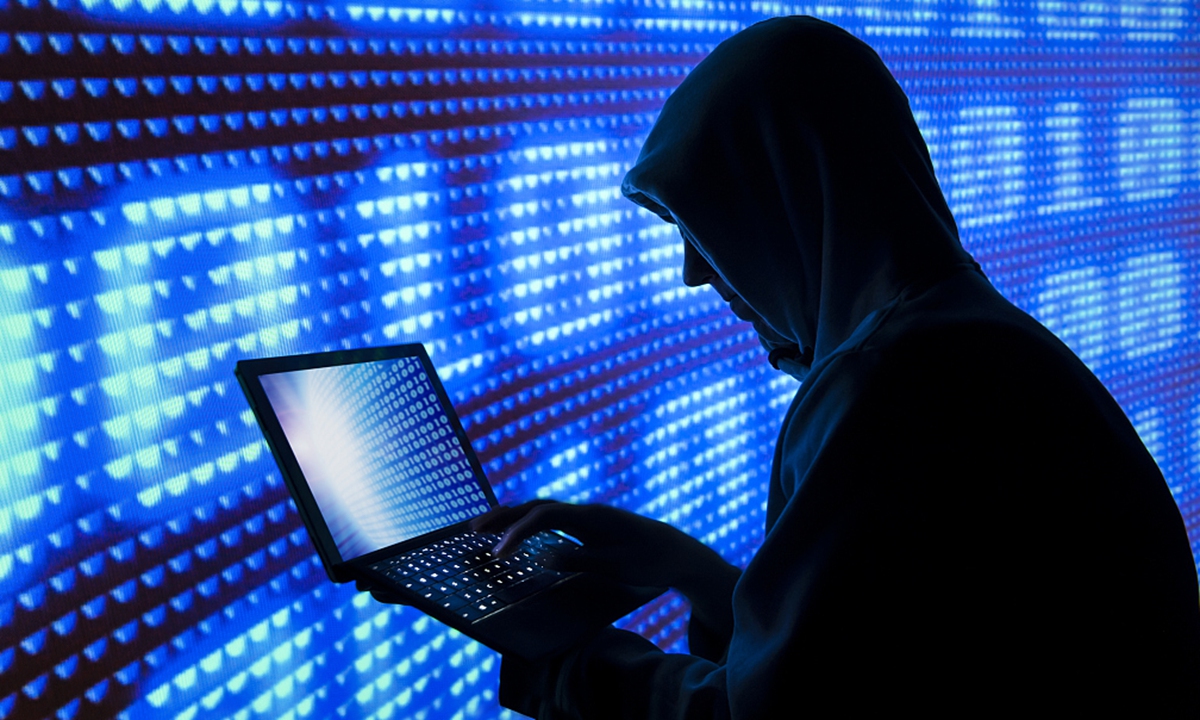
Cyber attack Photo:VCG
The British media went into a feeding frenzy this week, accusing China of hacking into a Ministry of Defence (MoD) computer system. However, one crucial aspect was largely downplayed. The defence secretary himself, Grant Shapps, not only pointedly refused to blame China, but also gave a thoroughly plausible explanation of why he did not.
The story broke when one news broadcaster claimed - in an "exclusive" supported by an unattributed tip off - that British officials believed China was behind the cyberattack. Pretty soon, just about every print, broadcast and online news medium in the country had followed up, and had conveniently found their own "anonymous sources" to support their own stories painting China as the villain. This invites the question: are there suddenly lots of anonymous sources roaming the UK's media landscape - or is it just one organized, focused, and plausibly deniable source (perhaps not unadjacent to someone in government)?
Following the coverage of the issue, it was raised in the House of Commons, and politician after politician queued up to accuse China of sinister, underhand interference at the MoD, including well-known anti-China hawks like Iain Duncan Smith, Alicia Kearns and Tobias Ellwood. One even went so far as to suggest a cyberattack could justify the activation of NATO's Article 5. If the media was frenzied, then politicians were hysterical.
Fortunately, during the debate, one Member of Parliament mentioned the elephant in the room: that it was obvious the government had been briefing off-the-record against China, enabling the allegation to gain traction in the news - and as a result embed itself in the public and political consciousness - while not having the courage to blame China publicly. Shapps said that "due process" must be followed and warned against jumping to conclusions before investigations were completed.
In refusing to lay the blame at China's door, Shapps, the MoD, and even Downing Street were swimming against strong currents of popular, political and press opinion which they themselves had so obviously stirred up. Shapps would only go so far as to blame a "malign actor" which theoretically could include criminal hackers rather than another state. He even admitted that the government did not believe the data containing the names and bank details of up to 270,000 serving, reserve and retired personnel had even been lost. China is not only being blamed for a hack, but for a hack in which nothing was stolen. So, was this a storm in a tea cup? Perhaps it would have been, had a decision clearly not been taken by someone in authority to leak that officials suspected China of the attack. Whatever the outcome of investigations, it is obvious that a decision was shamelessly taken to try and gain political capital from the scandal, whether it was real or imagined.
Shapps' caution in refusing to overtly point the finger may have been wise. For one thing, he repeatedly responded to MP's questions during the Commons debate by referencing the Butler Review. This was an inquiry conducted in the aftermath of the Iraq War, in which secret intelligence was used by British politicians to shape public opinion in favor of the conflict. The review found that politicians, including the then prime minister Tony Blair, used the raw data to reinforce their preconceptions, leading to a distorted analysis.
However, there is another consideration.
One of the few laudable traditions of the UK's archaic parliamentary system is that telling lies to your colleagues in the House of Commons is considered a heinous offence. To knowingly, deliberately mislead your fellow MPs is a transgression considered worthy of punishment by exclusion from the chamber, and perhaps even resignation.
So if Shapps had told Parliament in his statement last Tuesday that China was the state actor behind the hacking, and it was subsequently shown not to be, he could have landed in deep trouble.
Common sense tells us that the repeated "leaks" from someone within the corridors of power must have had official sanction. Even some MPs think so. It makes no sense to consider that there are many anonymous sources prepared to tell exactly the same story to a wide range of media outlets - rather, it makes complete sense to believe there is but one source, repeating the same story again and again. Could this have been Shapps' way of circumventing the requirements of the Butler Review in order to raise the profile of the story (and possibly of himself)? An alternative is that he did not want to get caught deliberately misleading the House, which would mean that he knows China is not the hacker, but wanted to benefit in stature from the outrage the misinformation created.
You don't have to be a conspiracy theorist to consider the blaming of Beijing for a cyberattack in which nothing was stolen as a cynical attempt to exploit the almost ubiquitous anti-China sentiment in the Western media and political circles. Journalists and politicians are like hungry piranha which churn up the water in a feeding frenzy whenever a China-critical story emerges. Unfortunately, this time the story had more holes in it than a fishing net.
The author is a journalist and lecturer in Britain. opinion@globaltimes.com.cn
